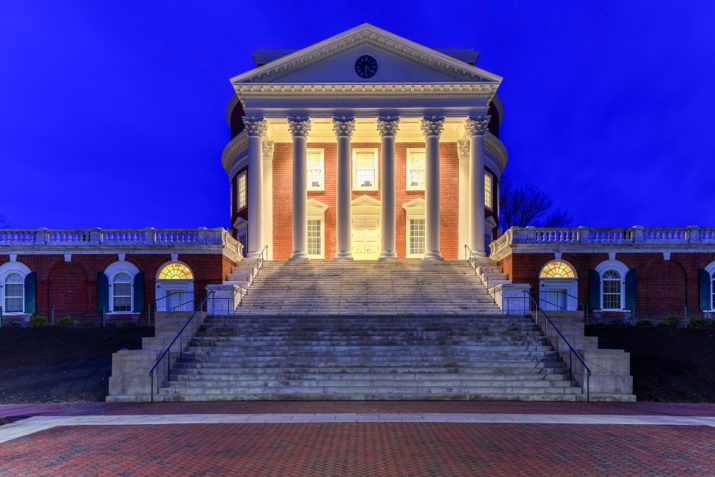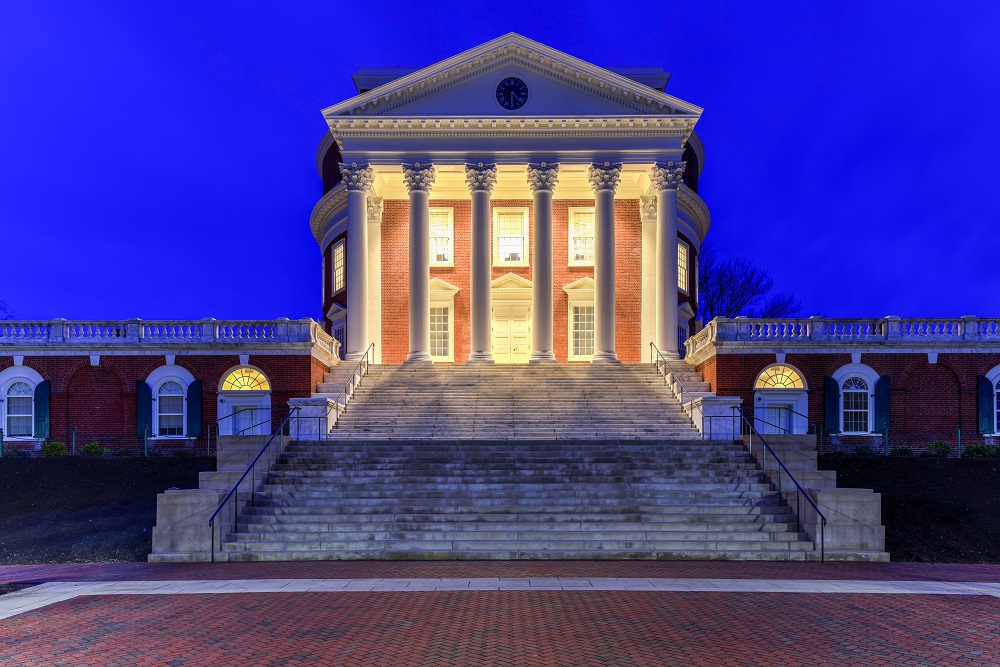

This is part of our Campus Spotlight on the University of Virginia.
UVa Faculty and Students Respond to August 11/12, 2017.
This reading list provides links to first responses of UVa faculty and students to the rallies of white supremacists and neo-Nazis on University Grounds and in downtown Charlottesville. Please note that this list does not seek to be comprehensive. Additional articles of equal importance and value can be found on the internet or are to be published in revised form in forthcoming books and edited volumes.
– What U.Va. Students Saw in Charlottesville; New York Times Opinion, August 13, 2017
One day after the college town of Charlottesville had become the scene of deadly chaos caused by a rally of white supremacists, The New York Times reached out to University of Virginia students to reflect on the event. The student accounts bear witness to the hate-filled chants and physical violence of alt-right protesters but also articulate the hope that we can work toward a more open and inclusive society.
– Brian Balogh: “Shock And Outrage At University Of Virginia After White Nationalist Rally,” Here and Now, August 14, 2017
Brian Balogh is the Dorothy Danforth Compton Professor at the Miller Center and Professor of History at the Corcoran Department of History at the University of Virginia. He is the founder and Director of the Jefferson Scholars Foundation National Fellowship Program which has funded over 160 dissertation completion fellowships for scholars studying American politics and public policy from an historical perspective. Balogh focuses his interest on 20th Century U.S. Politics, American Political Development, Environmental History, the history of Science and Technology, and the history of Media and Politics. He shares his enthusiasm for American history as co-host of Backstory, a nationally syndicated weekly podcast downloaded half a million times each month.
– Chad Wellmon: “For Moral Clarity, Don’t Look to Universities,” The Chronicle of Higher Education, August 14, 2017
Chad Wellmon is an Associate Professor of German Studies and the Principal of Brown College. He chaired the General Education Committee that led the curriculum reform process of the College of Arts and Sciences. Wellmon’s primary research and teaching areas include European intellectual history, Romanticism, and media and social theory.
– Mary Wood, “Standing Up for Charlottesville: Students, Faculty, Alumni and Staff Bear Witness to Protests as They Defend Community,” School of Law: News and Media, August 16, 2017
Mary Wood is chief communications officer for the School of Law, where she manages the school’s media relations and publicity, UVA Lawyer magazine, website design and content, social media and marketing. Wood received her B.A. and M.A. in English from the University of Virginia. The articles on Charlottesville were meant to document the students’ and the school’s response to the events of Aug. 11-12, as well as that of faculty members whose scholarly work addresses some of the issues at stake.
Related articles by Mary Wood:
“Professors: It’s Legal To Take Down Confederate Monuments. Schragger, Schwartzman Explain Local, Federal Laws at Stake,” School of Law: News and Media, August 31, 2017
“Risa Goluboff Leads Response to Charlottesville Protests. Working Group Report Recommends Changes (UVA Lawyer);” UVa School of Law: News and Media, November 3, 2017
– Philip Zelikow, “The Domestic Terrorism Danger: Focus on Unauthorized Private Military Groups,” Lawfare, August 15, 2017
Philip Zelikow is the White Burkett Miller Professor of History at the University of Virginia. Early in his career he was a trial and appellate lawyer, handling civil rights and criminal cases in Texas. In addition to his academic work, he has worked at all levels of American government and has served at the national level in five administrations, from Reagan to Obama. He has worked on terrorism problems at many points over the years, including as the executive director of the 9/11 Commission. His books include Germany Unified and Europe Transformed: A Study in Statecraft (Harvard UP, 1995, with Condoleezza Rice); The Kennedy Tapes: Inside the White House during the Cuban Missile Crisis (Norton ed., 2001, with Ernest May); and America’s Moment: Creating Opportunity in the Connected Age (Norton, 2015, drafted on behalf of the Markle Foundation group, “Rework America”).
– Backstory: “Charlottesville: Our Town, Our Country,” August 18, 2017
BackStory is a weekly podcast, produced by Virginia Foundation for the Humanities. Each week, Ed Ayers, Brian Balogh, Nathan Connolly and Joanne Freeman explore the connections between the 18th, 19th and 20th centuries and the present. They offer surprising, non-partisan conversation about ideas, events and their continuing impact. Their deeply informed talks cover wide-ranging topics like fake news, political incorrectness and being Muslim in America. Ed, Brian, Nathan and Joanne exchange ideas with experts, talk with listeners and open a debate that is engaging and accessible. BackStory is available through iTunes, Google Play, Stitcher and other popular podcatchers. On this episode of BackStory, Brian, Nathan, Joanne and Ed discuss the horrific events that happened in Charlottesville last August, and how it fits into American history.
– John Edwin Mason: “Why Charlottesville?” The Stansbury Forum, August 19, 2017
John Edwin Mason teaches African history and the history of photography at the University of Virginia. In 2016 and 2017, he served on the City of Charlottesville’s Blue Ribbon Commission on Race, Memorials, and Public Spaces, which made recommendations to city council about the fate of Charlottesville’s Confederate monuments and about the need to create new, more accurate, and more inclusive narratives about the city’s history. He has published extensively on South African social and cultural history and on the histories of photography in South Africa and the United States. He is currently writing a book about Gordon Parks.
Related articles by John Mason: “#Charlottesville,” VQR, August 24, 2017
– A&S Dean Ian Baucom’s First Lecture to Incoming Students; August 21, 2017
Ian Baucom came to the University of Virginia after serving 17 years in Duke University’s Department of English as a professor and as the director of the John Hope Franklin Humanities Institute. Since arriving at UVA in the summer of 2014, Dean Baucom has led a series of initiatives within the College and Graduate School of Arts & Sciences, including an ambitious hiring campaign and a reform of the College’s undergraduate curriculum. Baucom is the author of Out of Place: Englishness, Empire and the Locations of Identity, and Specters of the Atlantic: Finance Capital, Slavery, and the Philosophy of History. He is the co-editor of Shades of Black: Assembling Black Arts in 1980s Britain.
– A Discussion with Jalane Schmidt on Charlottesville, Berkeley Center for Religion, Peace & World Affairs, August 24, 2017
Jalane Schmidt is an associate professor in the University of Virginia’s Department of Religious Studies. Her research and teaching are focused upon African diaspora religions of the Caribbean and Latin America, and particularly festivity and ritual. She teaches courses which consider the effects of colonization and the slave trade upon religious practice in the Americas. Schmidt is a Black Lives Matter activist, and on August 12, she was in Charlottesville organizing against the white supremacist Unite the Right rally. A related article by Schmidt describes the school’s history of connections to the KKK and its alumnus, white nationalist leader Richard Spence: “UVA Prof on UVA’s Historical Ties to KKK & White Nationalist Alums Richard Spencer & Jason Kessler,” Democracy Now, August 14, 2017
– Christine Mahoney: “Neo-Nazis have the right to free speech. They don’t have the right to deny it to the rest of us,” Quartz, August 14, 2017
Christine Mahoney is a Professor of Public Policy and Politics at the Frank Batten School of Leadership and Public Policy and Director of Social Entrepreneurship at the University of Virginia. She studies social justice advocacy, activism and direct action through social entrepreneurship. Her first book Brussels vs. the Beltway (Georgetown University Press) explored how advocates shape public policy in two of the most powerful political systems on the planet: the US and the EU. She conducted fieldwork in 7 conflict zones in Asia, Africa, Eastern Europe and Latin America for her second book Failure and Hope: Fighting for the Rights of the Forcibly Displaced (Cambridge University Press). The book argues we need to advance social entrepreneurship for the 60 million people displaced by violent conflict worldwide.
This article is an Op-Ed debunking the myth that the white supremacists that came to Charlottesville were interested in exercising their 1st Amendment rights related to confederate statues. Rather, it lays out how the alt-right systematically used violence to suppress the free speech of others.
– Charlottesville Syllabus (Last update August 20, 2017)
The Charlottesville Syllabus is a resource created by the Graduate Student Coalition for Liberation to be used to educate readers about the long history of white supremacy in Charlottesville, Virginia. With resources selected and summaries written by UVa graduate students, this abridged version of the Syllabus is organized into six sections that offer contemporary and archival primary and secondary sources (articles, books, responses, a documentary, databases) and a list of important terms for discussing white supremacy.
– Willis Jenkins, “Moral Trauma,” Berkeley Center for Religion, Peace & World Affairs, August 29, 2017
Willis Jenkins is Professor of Religious Studies and Co-Director of the Institute for Practical Ethics at the University of Virginia. He initially wrote “Moral Trauma” as a first-hand reflection for others who had been involved in community responses to white supremacist violence of August 11 and 12, and who found themselves struggling to articulate their experience.
– Liz Varon: “No, Mr. President, both sides aren’t to blame for Charlottesville — or the Civil War,” Washington Post, August 16, 2017
Liz Varon is the Langbourne M. Williams Professor of American History and the Associate Director of the John L. Nau III Center for Civil War History at the University of Virginia. This op-ed is based on her book Appomattox: Victory, Defeat and Freedom at the End of the Civil War (Oxford University Press, 2013). Varon traces the historical roots of the false equivalency between the Union and the Confederacy.She explains that “Lost Cause” mythology, which cast the Union victory as one of “might over right,” attempted to efface the Unionist understanding of the war as the triumph of right over wrong.
– Bonnie Gordon: “In the Aftermath of Charlottesville,” Musicology Now, September 8, 2017
Bonnie Gordon’s primary research interests center on the experiences of sound in Early Modern music making and the affective potential of the human voice. Her first book was Monteverdi’s Unruly Women (Cambridge University Press, 2004). She also co-edited with Martha Feldman an interdisciplinary and cross-cultural volume of essays entitled The Courtesans Arts, (Oxford University Press, 2006). Dr. Gordon is currently working on two book projects. Voice Machines: The Castrato, The Cat Piano and Other Strange Sounds considers the interrelated histories of music, technology, sound, and the limits of the human body. Jefferson’s Ear closely explores the historical record, especially what is and is not in Thomas Jefferson’s music collection. The book focuses on sound, music, and race in two locations: Monticello and New Orleans. Dr. Gordon also plays rock, jazz, and classical viola; works on curricular and co-curricular civic engagement programs that engage social injustice through the arts; and writes for news outlets, including the Washington Post and Slate.
– Elgin Cleckley: “I’m a Black Designer in Charlottesville. This Is What It Feels Like to Walk Through My City,” Next City, September 18, 2017
Elgin Cleckley, Assoc. AIA, NOMA, is an Assistant Professor of Architecture and Design Thinking at the University of Virginia’s School of Architecture, with an appointment in the Curry School of Education and School of Nursing. Elgin previously was the 3D Group Leader and Design Coordinator at the Ontario Science Centre in Toronto, Ontario, Canada. He is the Director of _mpathic design, an empathic human-centered design initiative, and consultancy firm.
– Eric Williamson: “Making Sense of What Happened in Charlottesville: Professors Sort the Cascade of Events From Legal, Historical Perspectives,” School of Law: News and Media, September 14, 2017
Eric Williamson is associate director of communications and senior writer at UVA Law. He is a graduate of the Henry W. Grady College of Journalism and Mass Communication at the University of Georgia. A related articles by Eric Williamson reports on student organizations’ efforts to support students and reclaim community: “After the Charlottesville Protests: Taking Care of Each Other,” School of Law: News and Media, September 27, 2017
– Krishan Kumar: “Mr. Jefferson’s University,” The Times Literary Supplement, September 19, 2017
Krishan Kumar is University Professor and Wiiliam R. Kenan, Jr., Professor of Sociology at the University of Virginia. He was previously Professor of Social and Political Thought at the University of Kent at Canterbury, England. Among his books are The Making of English National Identity (2003) and Visions of Empire: How Five Imperial Regimes Shaped the World (2017). He is interested in how past histories shape present concerns. His article, “Mr. Jefferson’s University”, responding to the events of August 11-12 at UVA and in the city of Charlottesville, was an attempt to apply a historical perspective in order to make sense of the attitudes of both sides to the conflict: the white supremacists, who claimed UVA as their own, and their opponents, who could draw upon Thomas Jefferson’s original Enlightenment vision and hopes for the University.
– Isaac Ariail Reed, “Jefferson’s Two Bodies: Memory, Protest, and Democracy at the University of Virginia and Beyond,” Public Seminar, October 19, 2017
Isaac Ariail Reed is Associate Professor of Sociology at the University of Virginia. He is the author of Interpretation and Social Knowledge: On the use of theory in the human sciences and the editor, with Monika Krause and Claudio Benzecry, of Social Theory Now, both published by University of Chicago Press. In 2015, he received the Lewis A. Coser Award for Theoretical Agenda-Setting from the American Sociological Association. This article was written as an engagement with student politics on campus in the fall of 2017, and it combines an analysis of the long arc of American political theology with an interpretation of the local meanings in the public life of the University of Virginia concerning Thomas Jefferson, slavery, and white supremacy. The full version of this article will appear in #Charlottesville: Before and Beyond, edited by Colin Laidley, Chris Howard-Woods, and Maryam Omidi and published by PublicSeminar.org.
– The Citizens Justice Initiative at the Carter G. Woodson Institute for African-American and African Studies: “The Illusion of Progress: Charlottesville’s Roots in White Supremacy.”
The Citizen Justice Initiative at the Carter G. Woodson Institute for African-American and African Studies is a digital storytelling and community engagement project sponsored by the Strategic Investment Fund of the University of Virginia. Throughout the summer of 2017, the Citizen Justice Initiative team, comprised of University of Virginia undergraduates and students from local area high schools, researched the history surrounding Charlottesville’s Confederate statues. The resulting resource, “The Illusion of Progress: Charlottesville’s Roots in White Supremacy,” situates ongoing debates regarding Confederate symbols within a long historical trajectory, from Thomas Jefferson to urban renewal, to engage with the structures and systems of white supremacy locally and its broader implications. The project builds on extensive work by members of the Charlottesville and University community, who were equally active during the summer of 2017 in collecting sources, making presentations, writing think pieces, and creating syllabi to educate onlookers, activists, and curious citizens about the roots of white supremacy locally and beyond. Since its release in September 2017, “the Illusion of Progress” has been used in classrooms at the University and High School level and workshops with K-12 teachers as well as served as a resource for researchers, members of the University community, and the broader public. For more information, contact the project director James Perla (jrp2gf@virginia.edu).
Published on February 1, 2018.




